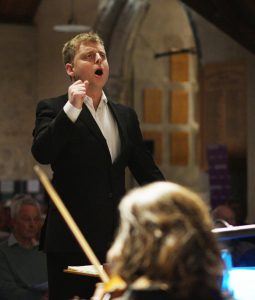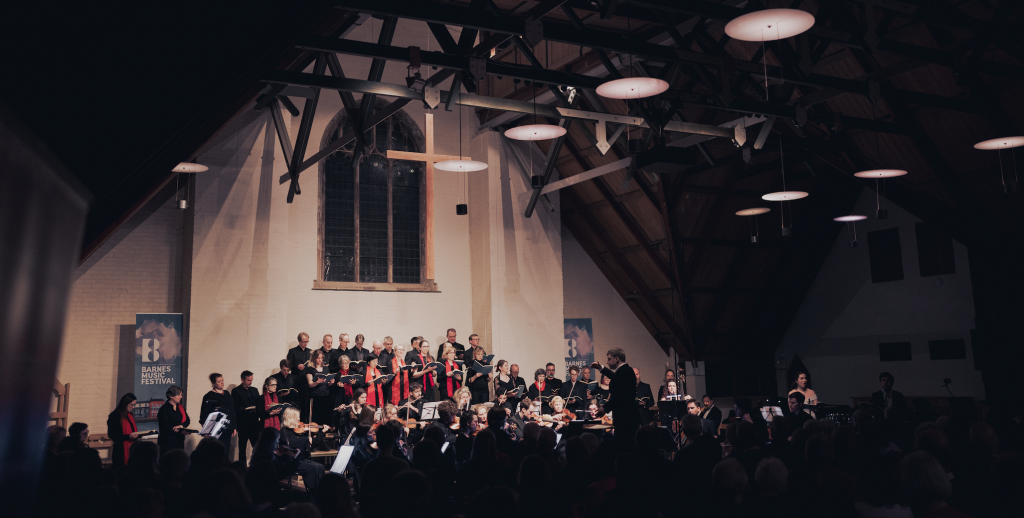 On Saturday 9th March, Pegasus choir, the Barnes Festival Orchestra and four soloists (Rebecca Hardwick, Rebekkah Jones, David de Winter and Jonathan Brown) opened the Barnes Music Festival with not one but two epic Magnificats – certainly not something for a quick evensong but multi-movement, richly varied works from JS Bach and from Stephen Dodgson – in the latter’s native Barnes and celebrating his centenary. It was a joyful concert for audience and performer alike, and I am moved to write a short blog about the occasion.
On Saturday 9th March, Pegasus choir, the Barnes Festival Orchestra and four soloists (Rebecca Hardwick, Rebekkah Jones, David de Winter and Jonathan Brown) opened the Barnes Music Festival with not one but two epic Magnificats – certainly not something for a quick evensong but multi-movement, richly varied works from JS Bach and from Stephen Dodgson – in the latter’s native Barnes and celebrating his centenary. It was a joyful concert for audience and performer alike, and I am moved to write a short blog about the occasion.
I, of course, risk being biased as I both work for the Stephen Dodgson Charitable Trust and sing with Pegasus. Although I also may offer a unique view for same reasons. I joined the Trust not knowing Stephen’s music and, in truth, having no idea what to expect. I have therefore gradually been immersing myself over the last six or seven years in more and more of his work, getting to know his sound world and his musical personality – first many of his chamber works, then his operas Margaret Catchpole and Cadilly and other lighter ‘entertainments’, then his wonderful songs and now his choral works over the last year, whether overseeing recordings, liaising and collaborating over live performances, looking over manuscripts or attending others’ concerts.
It’s been a fascinating journey and also really interesting watching others getting to know and understand his music too, whether the seasoned performer or the concert-going public – often Dodgson novices. While some of his music instantly appeals, other pieces may need sitting with, but I’ve found that Stephen’s distinctive musical language starts to speak to you and the reward is well worth the time spent.
—
Stephen Dodgson was originally commissioned to write his Magnificat by Denys Darlow and the Tilford Bach Society to be paired with the Bach Magnificat. He wrote it for the same forces, albeit the timpanist additionally plays side-drums, tamtam, vibraphone and tambourine, and the oboists double up on oboes d’amore. The Tilford Bach Society performed the pair at the premiere at the Queen Elizabeth Hall in 1975 and last Saturday, the audience were treated to the same pairing.
The first half of the Barnes concert – the Bach – was a festival of jubilant D major celebration, interspersed with stronger chromatic and minor sections in particular the beautiful plaintive alto-tenor duet ‘Et misericordia’ which gets me every single time. Festal fanfares from trumpets rang out and we in the choir delighted in Bach’s sense of dance and in shaping his delightfully challenging runs.
After the interval, we embarked on Stephen Dodgson’s take on the same text. The work marries a certain sense of unease within its wonder and awe. It started in a darker almost stark place – with a different kind of depth from the Bach. But it also took us and the audience through a variety of effervescent jazzy motifs, slightly off-kilter animated fugal passages, and wonderfully eerie and almost misty orchestration and tonalities where major and minor seemed to exist simultaneously. (For more about the piece, see my programme notes from the concert.)

Overall, performers and audience hugely enjoyed the performance. The Pegasus WhatsApp group was for days awash with singers reporting different little motifs and musical moments that they couldn’t get out of their heads and discussions of how ‘magnificent’ the occasion had been. The general consensus from the choir was that getting inside the Dodgson music and learning the notes was initially harder than with the Bach (albeit the Bach has more in the way of fast runs of semiquavers to learn): our first two rehearsals were without accompaniment and the Dodgson is a piece that’s so much a component of its many parts – the context of its intriguing choral and orchestral sound world as a whole. And then grew a real understanding of and passion for the piece, the final version of which the audience got to hear. One singer reported, ‘I met a couple of audience members on the train platform going back to Waterloo and they waxed very lyrical about the whole concert!’
A few more thoughts from our singers?
‘Turns out there were some great earworms and lush textures. I can imagine him pottering around at home humming or whistling some of the motifs.’
‘Stravinsky meets Finzi.’
‘Stephen Dodgson’s compositional voice is unique – there’s nothing quite like it. You can hear inspiration from other sound worlds like Holst, Bernstein and Elgar, but the way he utilises the ideas he picks up creates a completely new universe of sound.’
‘Stark. Uneasy. Worth the effort.’





